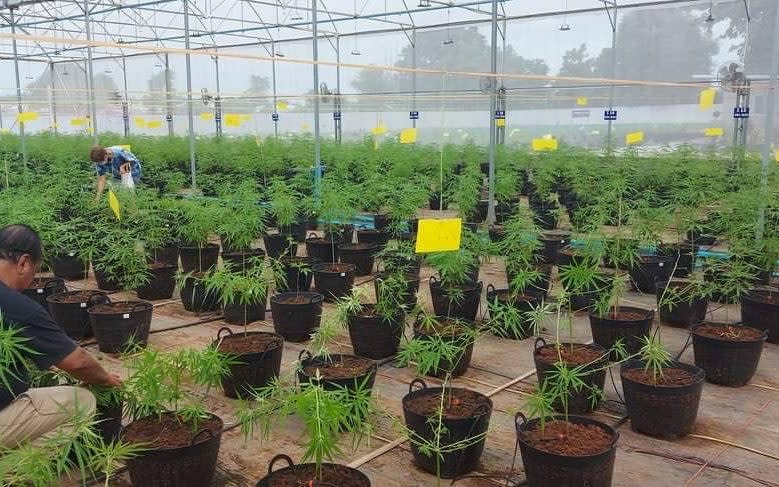Thai influencer says he’s ‘breaking up’ with cannabis as country plans to recriminalise drug

When Thai racer and actor Saranyoo Prachakit announced online that he was “breaking up” with cannabis because it was altering his brain, he didn’t think it would cause such a stir.
But within hours of posting his candid update on Instagram in late April, his words were plastered across the nation’s television screens.
“I decided to stop using weed and any products because I can’t understand small words or can’t focus seriously,” the 40-year-old, known locally by his nickname Beam, told The Telegraph. “[I’m] not motivated [to do] anything. I’m too slow, like a sloth.”
His experience appears to have struck a chord with millions of Thais, with mounting pressure for legalisation to be reversed later this year.
The sudden decision to completely decriminalise the drug in June 2022 defied Thailand’s reputation as hard on drugs and was controversial from the off.

But in the two years since, accusations that it was a political calculation which ignored public health have grown, with even progressive political parties viewing the experience as a failure.
There have been reports of more young people dropping out of schools, growing rates of addiction to harder substances, and farmers struggling to make a living from growing the crop due to oversupply.
Prime Minister Srettha Thavisin has said he wants to restrict use to medicinal purposes once again, as was the case prior to 2022, and tabled a draft cannabis bill earlier this year to close loopholes enabling recreational use.
“Cannabis policy will be medical cannabis,” he said in an interview shortly after taking office last year. “On recreational use, I do not agree with that.”
Analysts say new regulations are expected at the end of the year.
“There have been negative impacts on our society, community, children – especially from recreational use,” said Dr Natthanan Vijitakorn, a fellow at the Thailand Development Research Institute and head of a project assessing the cannabis fallout.

“The positives, those are unclear, made worse by insufficient law enforcement of the few regulations that do exist.”
With little oversight, business has since boomed.
Some 6,000 dispensaries have opened nationwide, especially in the capital and tourist hotspots, while more than a million farmers are growing the plant. According to the University of the Thai Chamber of Commerce, the sector could be worth $1.2 billion (£934 million) by 2025.
And although it is illegal to sell cannabis to anyone under 20, lax enforcement means it’s “easy” for young people to get hold of it, according to Phuvit Prasarthai, head of the Child and Family Development Organisation in Nakhon Ratchasima, eastern Thailand.
Rise in use
“Before legalisation, the use of cannabis was not distinctly noticeable…I think maybe five to ten per cent of young people used cannabis. I would say now it’s 50 per cent.”
Data nationwide is patchy, but the available figures suggest there has definitely been a substantial rise in use.
One study from the Centre for Addiction Studies, published last year, found almost 25 per cent of people aged between 18 and 65 had used cannabis since it was decriminalised, compared with 2.2 per cent in 2019.
Meanwhile, smoking among 18 and 19-year-olds has jumped tenfold, from 0.9 per cent in 2019 to 9.7 per cent last year.
In deprived neighbourhoods in Nakhon Ratchasima, Mr Phuvit said that he has seen a rise of “behavioural problems” linked to cannabis use, warning that many of the teenagers he works with have fallen behind at school, or dropped out altogether. But he is most concerned that it is a precursor to more serious addictions, including methamphetamine.
Gateway to other drugs
Dr Sahaphume Srisuma, a toxicologist at the Ramathibodi Poison Centre in Bangkok, agrees. “Legalisation has not seen harm reduction,” he said. “Instead it has been a gateway to other drugs for these kids.”
Doctors are concerned by what they’re seeing, and challenge the idea the drug is totally safe. At the Ramathibodi Poison Centre, which provides advice to non-specialist doctors across the capital, the number of calls for advice dealing with cannabis side-effects jumped from 252 in 2020 to 550 in 2022.
The National Institute of Drug Abuse Treatment’s main treatment centre in Bangkok has also seen a rise in emergency room patients with cannabis in their system - from 243 of 1,243 presentations in 2022, to 1,072 of 1,661 in 2023. Similarly, the proportion of cannabis users on the psychiatric ward rose from 8.3 per cent in 2020, to 32.15 per cent last year.
“There has been a lack of education about potential risks, which differ for everyone,” said Dr Sahaphume. “Cannabis has medicinal benefits if it is used safely, as a product prescribed by professionals to educated individuals… but this is only a small proportion of users in our country right now.”
Economics are also at play.
When the Bhumjaithai party pushed through decriminalisation, they argued it would be a financial boon for many poorer farmers in their stronghold in eastern Thailand. But a surge of growers, coupled with illegal imports, has limited returns for many.
No profit
“When we grew rice, we could make a profit of 3,500 baht [£75] per rai [1,600 square metres],” said Theppabut Sangsuk, a member of a cooperative in Nakhon Ratchasima.
The farmers thought they would make at least 10 times that with cannabis, he said, but “we’ve had no profit because we cannot sell it”. Instead, they’re 10 million baht in debt.
“It was 100 per cent a mistake. We feel misinformed by the government, we invested a lot of money to grow cannabis and haven’t seen any returns,” Mr Theppabut said. “So much money, gone.”
Pro-cannabis growers said this issue would have been solved if the government cracked down on “cannabis cowboys”, restricted on licences, and made fewer unrealistic promises.
“There’s definitely an oversupply issue,” said Kitty Chopaka, a cannabis campaigner and shop owner. “But issues could be solved with a review of regulations. It would be crazy to think this would work perfectly immediately… that doesn’t mean we need a complete clampdown.”
She argued that cannabis is being “demonised” and blamed for other societal problems: “It’s a bit like blaming violence on games, or laziness on social media.”
“The more problematic drugs of choice are cough syrup, kratom, codeine, meth – these are a lot cheaper than cannabis… A cough syrup bottle costs about $1.8, cannabis on average is $10 per gram. What kids have that money?”

 Yahoo News
Yahoo News 
